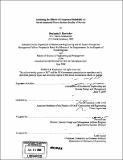Analyzing the effects of component reliability on naval Integrated Power System quality of service
Author(s)
Hawbaker, Benjamin F. (Benjamin Forrest)
DownloadFull printable version (7.668Mb)
Other Contributors
System Design and Management Program.
Advisor
Joel F. Harbour.
Terms of use
Metadata
Show full item recordAbstract
The Integrated Power System (IPS) is a key enabling technology for future naval vessels and their advanced weapon systems. While conventional warship designs utilize separate power systems for propulsion and shipboard electrical service, the IPS combines these functions. This allows greater optimization of engineering plant design and operations and leads to significant potential lifecycle cost savings through reduced fuel consumption and maintenance. Traditionally the focus of power system design has been survivability, with the assumption that service continuity was inherently provided. A new probabilistic metric, Quality of Service (QOS), now allows the power continuity and quality delivered to loads to be addressed explicitly during the design of IPS vessels. This metric is based both on the reliability of the power system components and the system architecture employed. This thesis describes and implements a method for modeling and evaluating the effects of component reliability on the QOS performance delivered by a current generation IPS architecture. First a representative "ship" is created, based largely on the U.S. Navy's ZUMWALT class destroyer (DDG-1000), including electrical loads, an operating profile, and Integrated Fight Through Power system architecture. This simulated ship is then run through a reliability analysis model employing Monte Carlo Simulation techniques to evaluate the QOS performance of the power system. By treating the reliability of power system components as a variable, the model gives insight into the role component reliability plays within the given system architecture. A method is then proposed for extending this analysis to comparative studies between future IPS architectures or components, with the ultimate goal of allowing research and development efforts to better focus precious funding and resources on areas with the greatest potential for high-value improvement.
Description
Thesis (Nav. E.)--Massachusetts Institute of Technology, Dept. of Mechanical Engineering; and, (S.M.)--Massachusetts Institute of Technology, System Design and Management Program, 2008. Includes bibliographical references (leaves 66-68).
Date issued
2008Department
System Design and Management Program.; Massachusetts Institute of Technology. Department of Mechanical EngineeringPublisher
Massachusetts Institute of Technology
Keywords
Mechanical Engineering., System Design and Management Program.